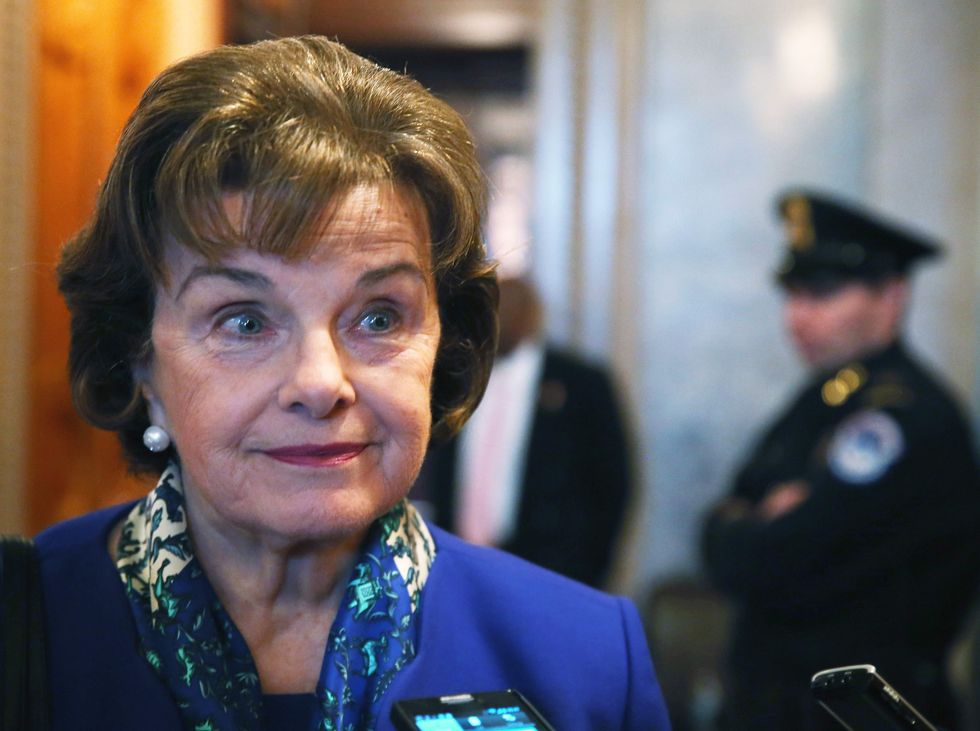
Sen. Dianne Feinstein (D-Calif.) said over the weekend that if President Donald Trump attempts to fire special counsel Robert Mueller, then that will mark the "beginning of the end" of his presidency. (Mark Wilson/Getty Images)

A top Senate Democrat declared over the weekend that if President Donald Trump attempts to fire FBI special counsel Robert Mueller, that would mark the “beginning of the end” of his presidency.
Mueller, appointed in May after Trump fired James Comey as FBI director, has been tasked with moving forward the FBI’s investigation into Russian interference in the 2016 election, which includes allegations that Trump’s presidential campaign had inappropriate contacts with Russian officials.
Trump has made his disdain for Mueller's investigation public, even several times calling it a “witch hunt.” In recent weeks, there have been rumors that Trump has examined the possibility of firing Mueller, but that decision is unlikely — let alone potentially illegal due to special counsel regulations adopted in 1999 that allow only the attorney general to dismiss a special counsel.
Rumors have begun to swirl that Trump might instead dismiss Attorney General Jeff Sessions. Trump has publicly stated his frustrations with Sessions over his decision to recuse himself from the FBI’s Russia investigation. If Trump were to dismiss Sessions or shuffle him to another position in the Cabinet, Trump could appoint a new attorney general that shares his sentiments about Mueller's investigation.
But according to Sen. Dianne Feinstein (D-Calif.), if Trump were to attempt any of that, especially firing Mueller, it would begin the snowball that ends his still-youthful presidency.
"Well, Chairman [Chuck] Grassley has put the bit between his teeth and said that there will be no hearings [for a new nominee for attorney general], Mr. President, if you go ahead and fire Jeff Sessions. I think there has been sufficient opposition for the president not to do so, unless, of course, what he really intends is to end up firing Mueller, which could well be the beginning of the end of his presidency,” Feinstein said on CBS “Face the Nation” Sunday.
.@SenFeinstein says if Trump intends to fire Mueller it could be the "beginning of the end of his presidency." pic.twitter.com/K3q9Ok2p4Y
— Face The Nation (@FaceTheNation) July 30, 2017
Indeed, Feinstein's prediction has some historical precedent.
Amid intense scrutiny during the height of Watergate scandal in 1973, then-President Richard Nixon ordered his attorney general to fire the special prosecutor, Archibald Cox, who had been appointed to carry out the Watergate investigation.
His attorney general refused and later resigned. Nixon then gave the same order to the deputy attorney general, who also refused and resigned.
According to Neal Katyal, the former acting U.S. solicitor general who helped craft the 1999 special counsel regulations, Nixon's actions on that day — known as the "Saturday Night Massacre" — led to Nixon's eventual downfall, which is why the regulations prevent a president from having the authority to summarily dismiss a special counsel.
However, as Feinstein referred to, Senate Judiciary Committee chairman Chuck Grassley (R-Iowa) last week alluded that if Trump chooses to fire Sessions from the DOJ, then his committee will not confirm a new attorney general for Trump anytime soon. That means for the time being, Trump will have to accept Mueller and his team of investigators.